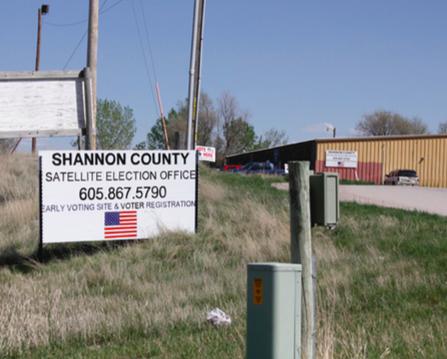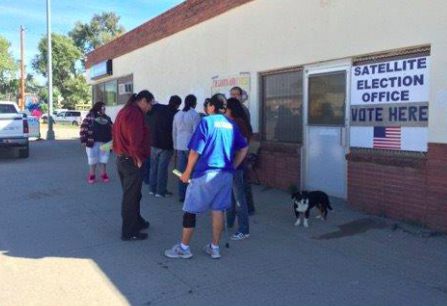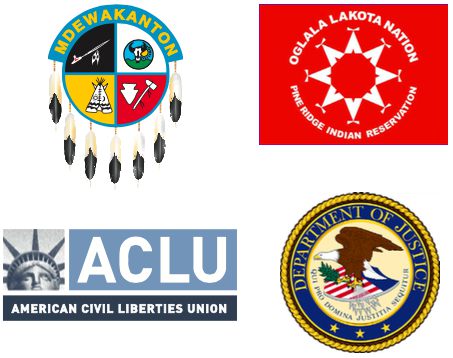2010: “The Battle of Fall River”
“We’re not asking to be special; we’re asking to be equal.”
OJ SEMANS, CO-EXECUTIVE DIRECTOR, FOUR DIRECTIONS
STEPHANIE WOODARD, INDIAN COUNTRY TODAY MEDIA NETWORK, 9.8.10
The Problem
What if there’s no election in Shannon County, South Dakota, home of the Pine Ridge Indian Reservation? That’s the question Four Directions confronted in 2010 when election officials from neighboring Fall River County, who administer Shannon County’s elections, resigned after Four Directions requested full days of in-person early voting on the reservation. Fall River county officials balked at the expense and need of in-person early voting despite an April 2010 Department of Justice compact requiring equal access to voting in Shannon County.
With just weeks to spare before early voting started, Four Directions had to move fast. The Battle of Fall River, as one reporter called it, was on.
The Solution
Four Directions summoned the American Civil Liberties Union Voting Rights Project and officials at the U.S. Department of Justice to hold election officials accountable, leveraged our strong relationship with the Oglala Sioux Tribe President to demonstrate need, and offered to cover $5,000 in expenses for equal access to in-person early voting.
The Four Directions Approach
In early August, Four Directions met with Fall River County election officials to negotiate the establishment of in-person early voting in Shannon County. The election officials made clear that if a request was made, they would resign to prevent in-person early voting. Four Directions decided to call their bluff.
Oglala Sioux Tribe President Theresa Two Bulls made an official request in mid-August to open two satellite voting offices in Shannon County with Four Directions paying for the administration cost. The Shannon County Commission met to consider the request on September 3. Before Four Directions could address the request, the Fall River County election officials resigned.
We knew Fall River County was negotiating from a weak position since their contract required them to administer an election approved by the Shannon County Commission, so we brought all our tools to bear at the next commission meeting on September 24, 2010.
At the September 24 meeting, Two Bulls reiterated her formal request in person at a Shannon County Commission meeting with Four Directions and our additional partners beside her. We had notified the U.S. Department of Justice about the election emergency, and their voting rights lawyer Sarabeth Donovan delineated the obligations laid out in the April compact. Our partners at the American Civil Liberties Union Voting Rights Project observed the meeting to hold election officials accountable. And to seal the deal, Four Directions again offered to pay $5,000 for in-person early voting to remove the expense of election administration.
Result
With the Four Directions approach bringing pressure to bear, the Shannon County Commission agreed to hold 22 days of in-person early voting. Rather than face public outcry for refusing to conduct elections, Fall River county officials retracted their resignations to follow the decision of the Shannon County Commission.
Months had passed since Four Directions made the initial request for in-person early voting, and our efforts had been met with hostility from local election officials and indifference from state election officials. For true equality, we realized, Native voters needed equal access to the ballot box. Our approach had to evolve.
With only 22 days of in-person early voting in the end, Four Directions encouraged partners to pursue legal options in Shannon County to finally achieve the full 46 days of equal access to in-person early voting for all Native voters.


Shannon County, Pine Ridge Move to Protect Voting Rights
STEPHANIE WOODARD, INDIAN COUNTRY TODAY MEDIA NETWORK; 9.8.10
Operations Analysis: The Battle of Fall River
STEPHANIE WOODARD, HUFFINGTONPOST.COM; 10.4.10
Stephanie Woodard’s reporting on voting rights and other human-rights issues has been supported by major journalism foundations including the George Polk Center for Investigative Reporting and the Fund for Investigative Journalism.
Partners

